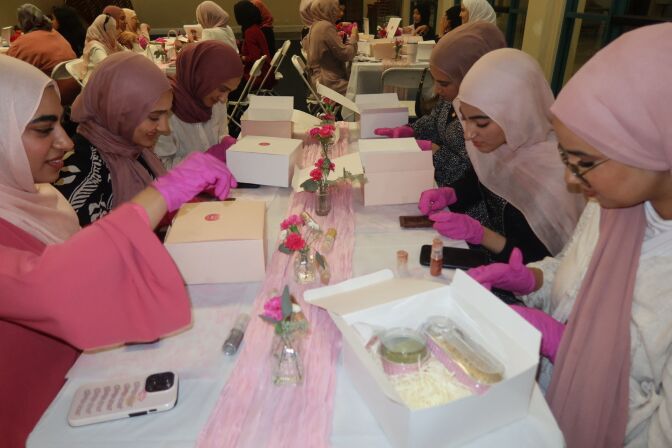This story is free to read because readers choose to support LAist. If you find value in independent local reporting, make a donation to power our newsroom today.
Muslim women in SoCal are creating third spaces to build community instead of ‘shrinking’ to fit in

On a Sunday as the sun set, women decked in embroidered thobes — or long robes — with gold coin jewelry around their necks and heads made their way to a community center in Brea. It was a henna celebration, a Levantine pre-wedding event to celebrate the bride and groom with music, dancing and adorning hands with a rich brown paste.

But this event had no groom, no bride and no wedding. Sabaya Club created the event for women from all over Southern California to gather, create community and celebrate each other – just with all the festivities people enjoy at henna events.
“ I decided to start (Sabaya Club) because after high school, after college, girls that are Arab, Muslim struggle to find friendships,” said Aya Humoud.
Sabaya Club and other groups like Her Gather and Muslim Women Professionals are part of a growing movement by Muslim women to create third spaces where they say they are understood and don't have to explain their faith or identity.

Studies have shown anti-Muslim bigotry disproportionately affects Muslim women for several reasons: they are more likely to be identified as Muslim if they wear a hijab, they are less likely to report hate crimes or discrimination and are perceived to be passive and needing saving. These spaces, community members say, provide Muslim women an opportunity to share their experiences and build community.
“A lot of them didn’t have a supportive community”
Sofia Haq, the founder and CEO of Muslim Women Professionals, said she started the organization in West Covina in 2016 after realizing Muslim women were “ navigating really big obstacles in our careers from how to get a promotion to how to deal with a racist boss to how to apply to a company that is maybe outside the realm of what you're used to applying to.”

And the response, she said, has been tremendous. The organization has grown to six chapters nationwide, underscoring, she said, how Muslim women “did not have a supportive community.”
The organization convenes events for Muslim women on topics like how to navigate building wealth and acing job interviews to hosting conversations on what it means to wear a headscarf in corporate spaces and creating templates on how to ask a boss for non-alcoholic happy hour options.
Taking up space

Anisa Abdulle started Her Gather — a community organization that hosts potlucks at the beach, pilates classes and picnics — for Muslim women to just be and not explain why they are “wearing the hijab or why they're not drinking or having to announce that they're gonna go pray.”
“ I feel like Muslim women are kind of tired of shrinking to fit into places we aren't that's not made for us,” she said.
The surge in these spaces is also coming from second and third generation Muslim women.
“ I feel like our parents generations came here, they were in a survival mode, so it was all about putting food on the table or like getting kids through school, navigating a new country,” she said.
The next generations of Muslim women, she said, are “not just surviving."
“We're trying to heal, connect and create — take up a space in a meaningful way,” Abdulle said.
Yusra Farzan served on the board of Muslim Women Professionals from 2018 to 2021.











